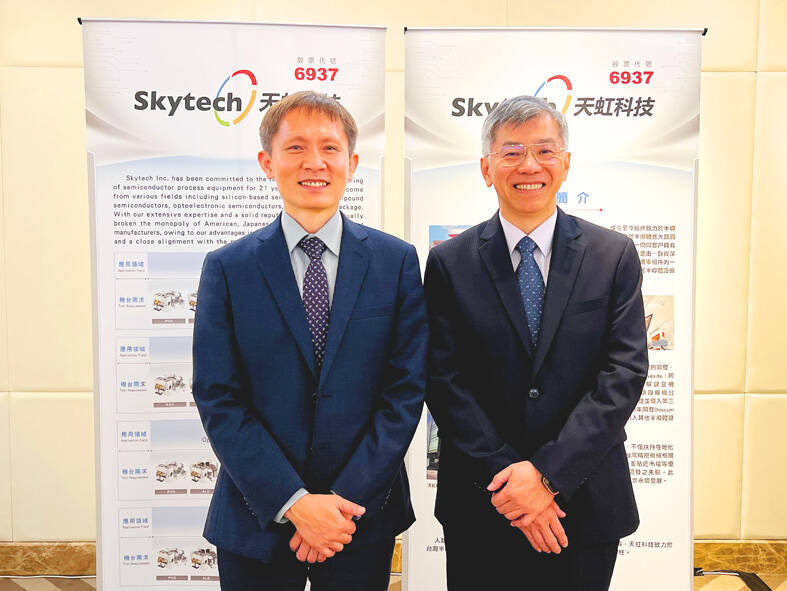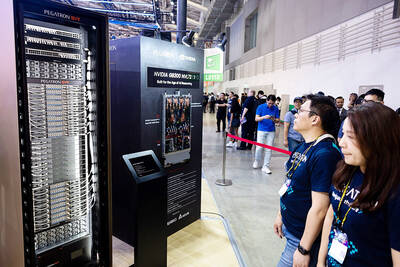Shares of semiconductor equipment maker Skytech Inc (天虹科技) soared 85.22 percent in the company’s debut on the Taiwan Stock Exchange, closing at NT$213, compared with the firm’s initial public offering price of NT$115.
Skytech aims to boost its revenue by 20 percent next year, outpacing the expected growth of the overall semiconductor industry.
The Hsinchu-based firm is among only a few Taiwanese companies that design and produce key equipment used in the chip manufacturing process.

Photo: Grace Hung, Taipei Times
It has a broad customer base that includes Taiwan Semiconductor Manufacturing Co (TSMC, 台積電).
Skytech’s revenue in the first three quarters of this year grew 12.83 percent year-on-year to NT$1.34 billion (US$42.53 million), with 70 percent generated by equipment used to produce compound semiconductors.
“We are looking at faster [revenue] growth than the overall semiconductor industry next year. That is our internal target,” Skytech chairman Paul Huang (黃見駱) told a media briefing in Taipei on Monday. “The main growth driver will come from the third-generation semiconductor, or compound semiconductor, segment primarily from China.”
Skytech expects revenue to climb to a new high next year, when the global semiconductor industry is expected to resume growth, expanding by 20 percent, according to an estimate by market researcher IDC Corp.
Skytech produces physical vapor deposition (PVD) and atomic layer deposition (ALD) equipment and charges 20 percent less than its major competitors.
ALD equipment an important part of next-generation semiconductor manufacturing.
The global PVD market is expected to expand at an annual compound rate of 5.8 percent to US$45.86 billion from last year to 2029, with the fastest growth in the Asia-Pacific region, Maximize Market Research said last month.
Applied Materials Inc is a key player in the PVD market, it said.
Skytech said it is working with its customers to design new equipment used in advanced technologies from 2.5-dimension to 3-dimension packaging technologies such as chip-on-wafer-on-substrate technology, as well as new silicon photonics technology, which ASE Technology Holding Co (日月光投控), the world’s biggest chip packager, and TSMC consider a crucial technology for the future of semiconductor manufacturing.
Skytech also supplies components and parts to chip makers, chip testing and packaging service providers, and other vendors.
The US’ semiconductor export curbs on China are not expected to affect Skytech’s business, as semiconductor components are not among the restrictions, the company said.
There is greater growth potential from Chinese semiconductor makers, as China is racing to increase chip self-sufficiency, it said.

AI TALENT: No financial details were released about the deal, in which top Groq executives, including its CEO, would join Nvidia to help advance the technology Nvidia Corp has agreed to a licensing deal with artificial intelligence (AI) start-up Groq, furthering its investments in companies connected to the AI boom and gaining the right to add a new type of technology to its products. The world’s largest publicly traded company has paid for the right to use Groq’s technology and is to integrate its chip design into future products. Some of the start-up’s executives are leaving to join Nvidia to help with that effort, the companies said. Groq would continue as an independent company with a new chief executive, it said on Wednesday in a post on its Web

RESPONSE: The Japanese Ministry of Finance might have to intervene in the currency markets should the yen keep weakening toward the 160 level against the US dollar Japan’s chief currency official yesterday sent a warning on recent foreign exchange moves, after the yen weakened against the US dollar following Friday last week’s Bank of Japan (BOJ) decision. “We’re seeing one-directional, sudden moves especially after last week’s monetary policy meeting, so I’m deeply concerned,” Japanese Vice Finance Minister for International Affairs Atsushi Mimura told reporters. “We’d like to take appropriate responses against excessive moves.” The central bank on Friday raised its benchmark interest rate to the highest in 30 years, but Bank of Japan Governor Kazuo Ueda chose to keep his options open rather than bolster the yen,

Even as the US is embarked on a bitter rivalry with China over the deployment of artificial intelligence (AI), Chinese technology is quietly making inroads into the US market. Despite considerable geopolitical tensions, Chinese open-source AI models are winning over a growing number of programmers and companies in the US. These are different from the closed generative AI models that have become household names — ChatGPT-maker OpenAI or Google’s Gemini — whose inner workings are fiercely protected. In contrast, “open” models offered by many Chinese rivals, from Alibaba (阿里巴巴) to DeepSeek (深度求索), allow programmers to customize parts of the software to suit their

Global server shipments are expected to surge to 15 million units next year, from 4 million units this year, with artificial intelligence (AI) servers accounting for about 30 percent, driven by massive capital spending by major cloud service providers, the Market Intelligence and Consulting Institute (MIC) said on Thursday last week. Major cloud service providers — including Google’s parent company Alphabet Inc, Microsoft Corp, Amazon.com Inc and Meta Platforms Inc — are projected to budget US$450 million for capital expenditure next year, up from US$400 million this year, MIC ICT [information and communications technology] Industry Research Center director Edward Lin